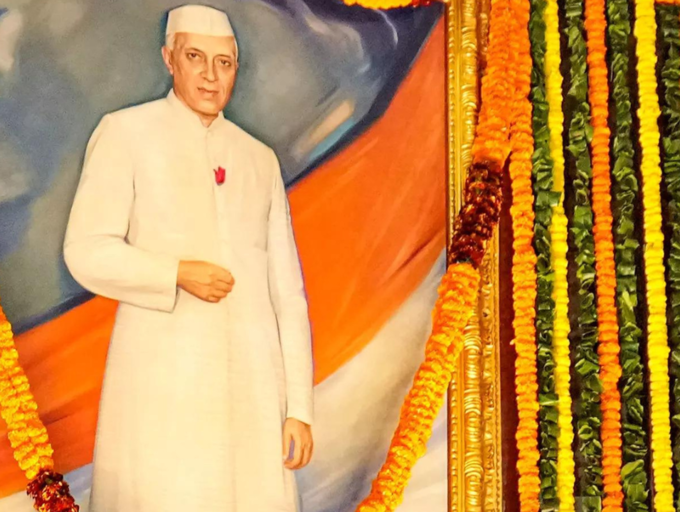


On the birth anniversary of India's first Prime Minister Jawaharlal Nehru, political leaders across the country paid their respects and remembered his contributions to the nation. Prime Minister Narendra Modi, Leader of Opposition Gandhi, and Congress President Kharge all shared heartfelt messages honoring Nehru's values and ideals, which continue to guide India towards progress and inclusivity. Congress leader Priyanka Gandhi Vadra also highlighted Nehru's unwavering commitment to fearlessness and selfless service in nation-building and urged the public to not be swayed by those who spread fear.
Remembering Jawaharlal Nehru: A Legacy of Progress and Inclusivity
India commemorated the birth anniversary of its first Prime Minister, Jawaharlal Nehru, on November 14th, with tributes and remembrances from political leaders across the country.
Nehru's Contributions to India
Widely regarded as the "architect of modern India," Nehru played a pivotal role in shaping the nation's destiny after independence from British rule in 1947. He led India through its formative years, steering the country toward a path of progress and inclusivity.
Political Leaders Pay Tribute
On Nehru's birth anniversary, Prime Minister Narendra Modi, Leader of Opposition Rahul Gandhi, and Congress President Mallikarjun Kharge shared heartfelt messages honoring his legacy. They praised Nehru's values of democracy, secularism, and social justice, which continue to guide India's growth and development.
Priyanka Gandhi Vadra, Congress leader, emphasized Nehru's unwavering commitment to fearlessness and selfless service. She urged the public to resist those who attempt to spread fear and division, values that Nehru strongly opposed.
Legacy of a Nation Builder
Nehru's influence on India is undeniable. He is credited with establishing the foundations of a modern, democratic nation. His vision of a secular, inclusive society, and his emphasis on economic development and scientific progress continue to shape India's trajectory today.
Top 5 FAQs
1. What was Nehru's role in India's independence movement? Nehru was a leading figure in the Indian National Congress, the political party that spearheaded the struggle for independence from British rule. He became the party's President in 1929 and played a key role in the Quit India Movement of 1942.
2. What were Nehru's key policies as Prime Minister? Nehru pursued a policy of non-alignment in international affairs, promoting peace and independence from both the Western and Eastern blocs. He also pushed for economic development, social reform, and scientific advancement.
3. What is Nehru's legacy? Nehru is remembered as a visionary leader who laid the foundations of modern India. He is widely credited for his role in establishing democracy, promoting economic growth, and shaping India's foreign policy.
4. How is Nehru remembered today? Nehru's birthday, November 14th, is celebrated as "Children's Day" in India. He had a deep affection for children and believed that they were the future of the nation.
5. What are the current challenges facing India that are rooted in Nehru's legacy? India continues to grapple with issues of poverty, inequality, and communalism. Nehru's vision of a secular, inclusive society remains a guiding principle in addressing these challenges.

Government officials in the UK are facing backlash from citizens as Storm Bram brings heavy rain and winds, leading to flood warnings and potential risks to life. Good Morning Britain presenters Richard Madeley and Susanna Reid raised concerns about the lack of warning to those living in affected areas, while viewers expressed frustration over inconsistent warning systems. With severe weather conditions expected to continue throughout the country, citizens are calling for better communication and preparation from their government.

A shocking conspiracy was uncovered by the Bihar Police when they arrested an individual from Bhojpur for allegedly issuing death threats to MP Pappu Yadav. The whole scheme was concocted by his close associates to garner enhanced security for Yadav. The arrested man, Ram Babu, has confessed to making a threatening video at the behest of the MP's associates, who had promised him a position in their party. Police are still investigating the instigator of this plot and are also looking into other aspects of the case.

Congress-led UDF emerged as the leading force in the Kerala local body elections, securing a majority in 505 out of 941 Grama Panchayats. Meanwhile, the BJP-led NDA made significant gains, winning the Thiruvananthapuram Corporation for the first time and retaining key municipalities. Union Home Minister Amit Shah credited the victories to PM Narendra Modi's leadership and vision for "Vikasita Keralam".

In a significant victory for the Aam Aadmi Party (AAP), three women candidates secured seats in the Kerala local body elections. Former Mayor and MCD AAP Councillor Dr. Shelly Oberoi congratulated the winners, praising their success as a strong example of women's empowerment. Meanwhile, Congress president Mallikarjun Kharge expressed his gratitude to the people of Kerala for giving a decisive verdict in favor of the United Democratic Front (UDF), while Prime Minister Narendra Modi acknowledged and praised the efforts of BJP workers in the state. This outcome reflects the increasing support for female leaders and potentially hints at a greater shift towards progressive politics in the state.

As the counting for the local body elections in Kerala began, the Congress-led UDF is in the lead in most of the city and town local bodies. This two-phase election, held on December 9 and 11, has seen a high voter turnout of over 70%. The results of this election will have a significant impact on the political landscape ahead of the 2026 Assembly elections in Kerala, with local body results often reflecting voter mood. Congress president Mallikarjun Kharge has expressed confidence in the UDF alliance's chances in the upcoming Assembly polls.

R Sreelekha, the former DGP and BJP's mayoral candidate in Thiruvananthapuram Corporation, secured a victory in the Sasthamangalam ward and pledges to deliver a corruption-free administration if given the chance to serve the public. Other notable victories in the corporation elections include former district president VV Rajesh and UDF mayoral candidate KS Sabarinathan. However, some high-profile defeats were seen, including actor Poojapura Radhakrishnan and Congress leader Johnson Joseph. Independent candidate Pattoor Radhakrishnan and Congress candidate Mary Pushpam also emerged victoriously in their respective wards.

According to sources, the Special Intensive Revision (SIR) exercise in West Bengal has identified a total of 58,80,202 voters who may be excluded from the draft voter list. This includes people who have passed away, transferred, missing, and identified as 'fake' by the Election Commission. These numbers are subject to change in the final list, which is set to be published on February 14, 2022. The commission has divided voters into three categories - own mapping, progeny mapping, and non-mapping - depending on their presence in the 2002 voter list. Those not falling into any of these categories will be called for a hearing by the EC.

In a significant shift in voter sentiment, the Congress-led United Democratic Front (UDF) is set for a decisive win in the Kerala local body elections, dealing a major setback to the ruling CPM-led Left Democratic Front (LDF) ahead of the 2026 Assembly elections. The UDF has consolidated its gains across urban local bodies, while the LDF's last-minute welfare push failed to curb anti-incumbency. The NDA also made significant gains, underlining its expanding presence in urban Kerala.

In a major upset, the BJP-led NDA has won the Thiruvananthapuram Municipal Corporation, ending the CPI(M)-led LDF's 45-year reign. The victory, with the NDA winning 50 out of 101 seats, is a boost for BJP's aspirations in Kerala's upcoming Assembly elections. The party's strong focus on development and Hindutva in Thiruvananthapuram, under the leadership of state unit president Rajeev Chandrasekhar, proved successful despite challenges faced during the campaigning. This victory has put the BJP in a strong position for the 2021 Assembly elections.

The Bharatiya Janata Party-led National Democratic Alliance (NDA) has taken a huge lead in Thiruvananthapuram Municipal Corporation, giving a setback to the ruling Left Democratic Front (LDF). Initial trends show the NDA leading in 25 wards, while the LDF is ahead in 15 wards and the UDF in 10 wards. This is a major blow to the LDF ahead of the upcoming assembly elections in Kerala, with a record voter turnout of 73.69%. The State Election Commission has also commended the peaceful conduct of the elections.